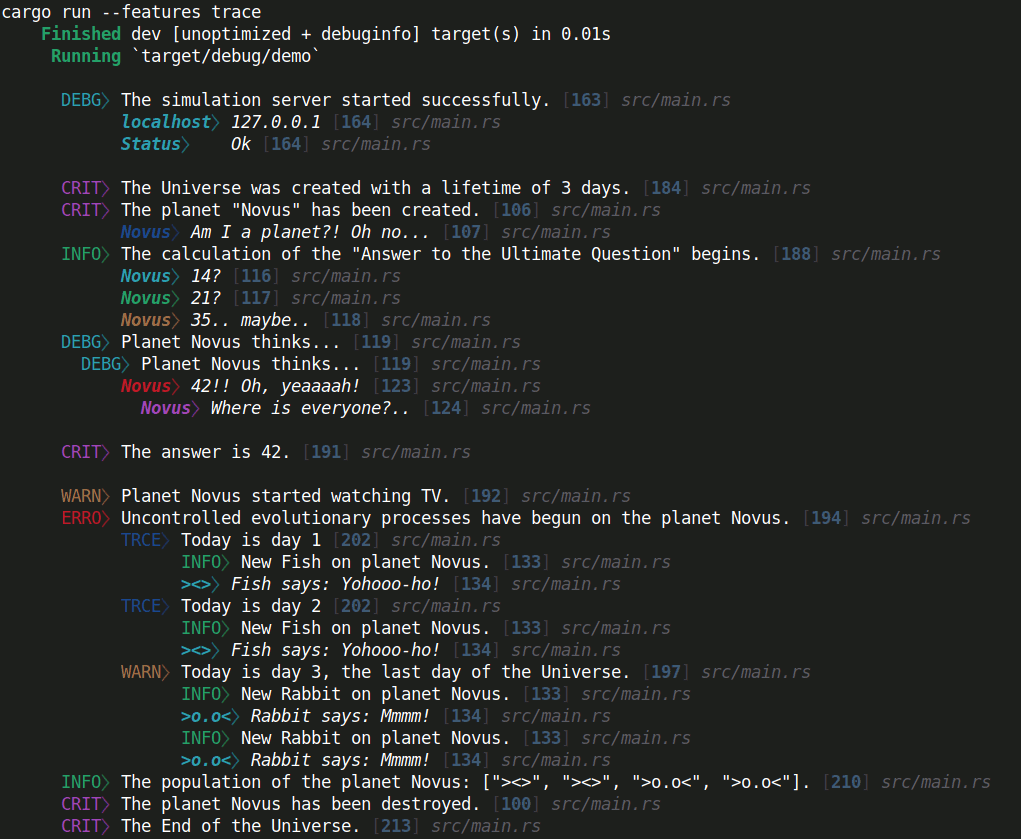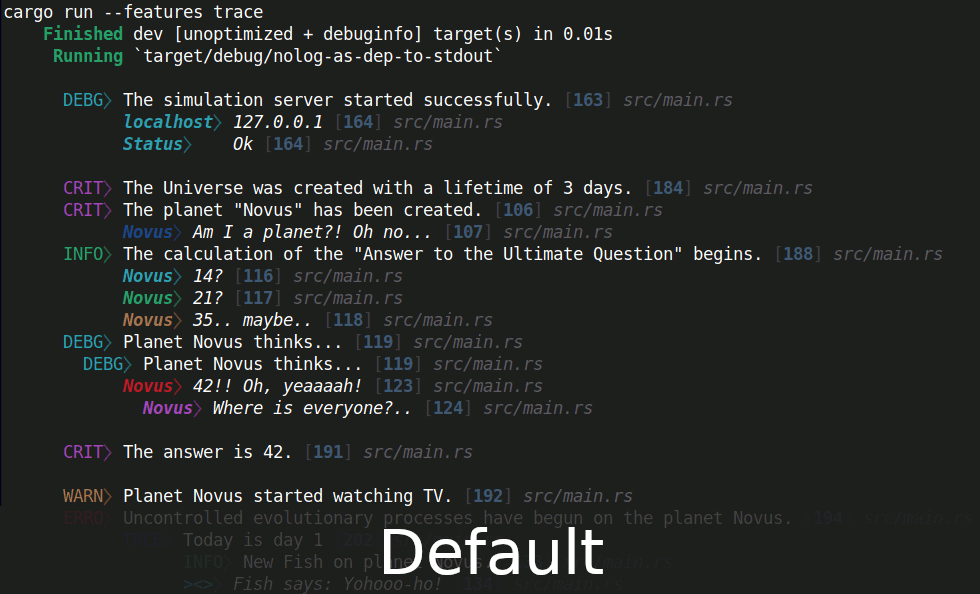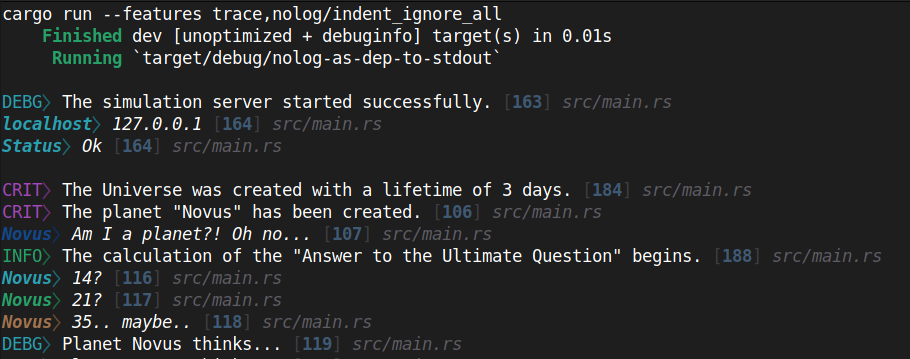
Convenient and 'beautiful by default' logger for debugging your programs.
Easy to use, you don't need to learn anything to start using it.
Zero deps. No unsafe (by #![deny(unsafe_code)]).

nolog uses a std::format_args!() (that avoids heap
allocations) and compile-time level filtering by Cargo features.
If you use the default setup without additional features (like logmod,
logonly, logcatch, tofile), then in most cases nolog will only
work on compile-time macros without using functions, methods, if
or loops. In fact it will expand into
the string eprintln!("{}", format_args!("{}{}{}{}"," ", "CRIT⧽", "msg", "[34] src/main.rs"));.
Nothing extra.logmod feature).logonly feature).Х messages
if an error or crit level message was triggered (logcatch feature).info!("{line_count} lines.");.key => value syntax: info!("{server}" => "{ip}");cargo run --release.
If you want the log to be enabled in the release build, then use
release feature: nolog = {version = "*", features = ["release"]}.debug level also
turns on the levels above it: info, warn, error, crit.
Level can be enabled using the console:
cargo run --features debug or in Cargo.toml:
nolog = {version = "*", features = ["debug"]}.
To enable all levels: cargo run --features trace.stderr. You can log to a file with
tofile feature. You may set the buffer size. Automatic flush after
each message will be used. If you want wait for the buffer to fill
or to do it manually with logflush!() then use no_auto_flush feature.file and to stderr
at the same time. An example is at the very bottom of the page.[2022-07-10 06:49:33.646361181 UTC]
using a third party library you like. An example is below.usual or key-value):
rust
info!(
"{server}" => "{ip}";
"Status" => "{server_check_result}";
);
Cargo.toml
```toml [dependencies] nolog = { version = "1", features = [] }
[features] nolog_setup = []
classicclassic_plaintrace = ["nolog/trace", "nologsetup"] debug = ["nolog/debug", "nologsetup"] info = ["nolog/info", "nologsetup"] warn = ["nolog/warn", "nologsetup"] error = ["nolog/error", "nologsetup"] crit = ["nolog/crit", "nologsetup"]
logonly = ["nolog/logonly"] logcatch = ["nolog/logcatch"] logmod = ["nolog/logmod"] ```
main.rs
```rust
extern crate nolog;
fn main() { trace!("linecount: {}", 42); debug!("linecount: {}", 42); info!("linecount: {}", 42); warn!("linecount: {}", 42); error!("linecount: {}", 42); crit!("linecount: {}", 42); } ```
nolog has the same syntax as most loggers based on the log crate.
nolog extends the log crate syntax by adding new features.
However, nolog is not based on log crate, it just has the same
macro names.
Therefore, switching to nolog will require minimal changes in the code.
In fact, this boils down to a change in Cargo.toml
and line extern crate nolog;.
Then:
sh
cargo run --features trace
Or, for example
```sh
cargo run --features trace,logonly,logcatch,logmod ```
It's the same but noisier
```sh
cargo run --features nolog/trace,nolog/logonly,nolog/logcatch,nolog/logmod ```
Result:

Cargo.toml
```toml
[dependencies] nolog = { version = "1", features = ["tofile"] }
```
main.rs
```rust use std::fs::OpenOptions; use std::io::{self, Read}; use std::path::PathBuf;
extern crate nolog;
fn main() -> io::Result<()> { let path = PathBuf::from("log.txt"); let file = OpenOptions::new() .read(true) .write(true) .create(true) .truncate(true) //^^^^^^^ truncate the file to 0 length if it already exists. //.append(true) .open(&path)?;
// Initialization
// Don't use macros like `debug!("msg");` before initialization.
logfile!(file);
trace!("Hello from file!");
let mut file = OpenOptions::new()
.read(true)
.open(&path)?;
let mut contents = String::new();
file.read_to_string(&mut contents)?;
println!("\n -- In {path:?} --");
println!("{contents}");
Ok(())
} ```
Optionally, you can set the buffer size.
rust
// Buffer `std::io::BufWriter` with capacity: 8000 bytes.
logfile!(8000, file);
The default is to automatically flush after each message.
If you want wait for the buffer to fill or to do it manually
with logflush!() then use no_auto_flush feature.
Cargo.toml
```toml
[dependencies] nolog = { version = "1", features = ["tofile", "noautoflush"] }
```
Then use logflush!() to flush the log manually.
main.rs
``rust
...
// Initialization
// Don't use macros likedebug!("msg");` before initialization.
logfile!(8000, file);
trace!("Hello from file!");
logflush!();
... ```
You can add a timestamp like [2022-07-10 06:49:33.646361181 UTC]
using a third party library you like.
For this example, we will use chrono crate.
Cargo.toml
```toml
[dependencies] nolog = { version = "1", features = [] } chrono = "0.4"
[features] customleading = ["nolog/customleading"] customtrailing = ["nolog/customtrailing"] custombeforemsg = ["nolog/custombeforemsg"] customaftermsg = ["nolog/customaftermsg"]
nologsetup = ["customleading"]
```
We have 4 options here:
- "customleading" - <TIMESTAMP>CRIT⧽ msg [5] src/main.rs
- "customtrailing" - CRIT⧽ msg [5] src/main.rs<TIMESTAMP>
- "custombeforemsg" - CRIT⧽ <TIMESTAMP>msg [5] src/main.rs
- "customaftermsg" - CRIT⧽ msg<TIMESTAMP> [5] src/main.rs
Log entry structure:
usual:
<indents><custom_leading><lvlheader><sep><custom_before_msg><msg><custom_after_msg><location><custom_trailing>
key-value:
<indents><custom_leading><lvlheader><sep_kv><custom_before_msg><key><sep_key><value_indent><value><custom_after_msg><location><custom_trailing>
Here is an example:
main.rs
```rust
extern crate nolog;
pub mod loggersetup { #[macroexport] #[cfg(feature = "customleading")] macrorules! // ^^^^^^^^^^^^^^ customleading { // usual ( $level:tt, $indent:expr, $($msg:expr),* ) => { formatargs!("[{}] ", chrono::Utc::now())
};
// key-value
( $level:tt, $indent:expr, $($key:expr),* => $($value:expr),* ) => {
format_args!("[{}] ", chrono::Local::now())
};
}
}
mod other { pub fn fromothermod() -> () { crit!(->[0] "Other" => "Hello from other mod! This is key-value msg."); } }
fn main() {
crit!("Hello from main! This is usual msg.");
other::fromothermod();
}
```
Output:
```sh [2022-09-07 09:22:09.150921578 UTC] CRIT⧽ Hello from main! This is usual msg. [34] src/main.rs [2022-09-07 12:22:09.150973037 +03:00] Other⧽ Hello from other mod! This is key-value msg. [29] src/main.rs
```
With classic style:
sh
[2022-09-07 09:29:45.859185734 UTC] CRIT: Hello from main! This is usual msg. [src/main.rs 34:5]
[2022-09-07 12:29:45.859225186 +03:00] CRIT: Other: Hello from other mod! This is key-value msg. [src/main.rs 29:9]
toml
nolog_setup = []
classictoml
nolog_setup = ["nolog/show_lvl_header_kv", "nolog/indent_ignore_all", "nolog/newline_ignore", "nolog/location_style_classic", "nolog/sep_colon"]
classic_plaintoml
nolog_setup = ["nolog/plain", "nolog/show_lvl_header_kv", "nolog/indent_ignore_all", "nolog/newline_ignore", "nolog/location_style_classic", "nolog/sep_colon"]

Messages in a chain should all be of the same type: usual or key-value
ususal
rust
debug!(
"Planet {name} thinks...";
"Planet {name} thinks...";
);
key-value
rust
debug!(
"{server}" => "{ip}";
"Status" => "{server_check_result}";
);
Add it as early as possible in the code:
rust
logmod!(
[ ] main,
[!=] crate::other2,
);
[] - Include a module and all its submodules.[=] - the same (Include a module and all its submodules).[!] - Exclude a module and all its submodules.[==] - Include only this module without submodules.[!=] - Exclude only this module without submodules.Then
cargo run --features trace,logmod
This is useful for debugging to get messages from just a small piece of code.
rust
logonly!(
let universe = [0;3];
crit!("The Universe was created with a lifetime of {} days.", universe.len());
error!("Uncontrolled evolutionary processes have begun on the planet {planet_name}.");
);
Then
cargo run --features trace,logonly
You can use any brackets
logonly!(), logonly!{}, logonly![].
You can use multiple logonly!() blocks. Messages will be displayed from all.
It won't break your code when the logger turns off in release build. So you can leave these blocks in the code.
When disabled, the definition of this macro will be replaced with the following:
rust
logonly { ( $($a:tt)* ) => { $($a)* }; }
It simply writes down the code it received.
Hide all messages, show the previous Х messages if an error or crit
level message was triggered.
By default X=10. You can change this anywhere in the code.
rust
// This will take effect for the code below.
logcatch!(2); // now X=2
To enable this feature, use:
cargo run --features trace,logcatch
Each new line created with newline!() or ->[_,1,1](about
what it will be below) counts as a separate message.
You can disable individual messages without removing them from the code.
A macro like debug!([_]; "msg") will expand into an empty tuple ().
```rust // on info!([#]; "New {name} on planet {planet_name}.");
// off info!([_]; "{repr}" => "{name} says: {speech}"); ```
You can use any options you like:
On:
[#], [x], [v], [+], [on], [true], [your_var]
Off:
[ ], [_], [-], [off], [false], [your_var]
your_var should be bool.
To change states, you need to change only one character:
[_] --> [#].
This also works with chained messages, but disables the entire chain. You can't turn off a single message in a chain.
rust
crit!([_];
"The answer is {answer}.";
"Planet {planet_name} started watching TV.";
);
You can turn off the action of block logonly. This will not affect
the code, the effect is as if macro logonly was not in this place.
rust
logonly!{[_];
crit!("The answer is {answer}.");
let x = 42;
}
This way you can leave logonly!() in the code and if it is required
in the future just enable it.
If necessary, you can control messages using variables and expressions.
rust
let my_log_enabled = true;
crit!([my_log_enabled]; "The planet {} has been destroyed.", self.name);
rust
let status = "ok";
crit!([(status == "ok")]; "The planet {} has been destroyed.", self.name);
// ^ ^
// Add parentheses
rust
fn is_message_show_fn () -> bool { false }
...
crit!([(is_message_show_fn())]; "The planet {} has been destroyed.", self.name);
// ^ ^
// Add parentheses
newline!(2); - It will simply write the passed number of new lines to the log.
Indents are of several types:
Base indent will be added to every line.
- Default for all: 6 indents. One indent equals one space.
You can change base indent with cargo features:
indent_base_zeroindent_base_oneindent_base_twoindent_base_threeindent_base_fourindent_base_fiveindent_base_sevenindent_base_eightindent_base_nineindent_base_tenFor example in Cargo.toml:
```toml nologsetup = ["nolog/indentbase_zero"]
trace = ["nolog/trace", "nolog_setup"] ```
usual: 0key-value: 6The default indentation is used if no value has been provided by the user.
You can specify indentation in the following way:
crit!(->[X,Y,Z] "msg");
X - Indents.Y - Add Y blank lines before message (same effect as newline!(Y)).Z - Add Z blank lines after message.All of these arguments are optional:
rust
crit!("msg");
crit!(->[1] "msg");
crit!(->[6,1] "msg");
crit!(->[1,2,3] "msg");
crit!([#]; ->[1,2,3] "msg");
If you want to add blank lines and leave the default indentation:
rust
crit!(->[_,1] "msg");
crit!(->[_,_,2] "msg");
The same works for each message in the chain.
rust
debug!(
->[2] "Planet {name} thinks...";
->[_,1] "Planet {name} thinks...";
"Planet {name} thinks...";
);
key => value have an indentation of 6 by default, but you can reset
it by setting it to zero.
rust
error!(->[0] "{name}" => "{}!! Oh, yeaaaah!", 2*3*7);
Or you can do it via Cargo.toml for all messages.
indent_kv_default_zeroindent_kv_default_oneindent_kv_default_twoindent_kv_default_threeindent_kv_default_fourindent_kv_default_fiveindent_kv_default_sevenindent_kv_default_eightindent_kv_default_nineindent_kv_default_tenFor example in Cargo.toml:
```toml
nologsetup = ["nolog/indentkvdefaultzero"]
trace = ["nolog/trace", "nolog_setup"] ```
Key-values have the additional ability to set indentation not only for the key, but also for the value.
rust
debug!(
"{server}" => "{ip}";
"Status" => ->[3] "{server_check_result}";
);
This allows you to get nice aligned output if you want.

You can use variables to set the indentation and add blank lines.
rust
for i in 0..2 {
warn!(->[i,i,i] "msg");
}
Ignore all types of indentation.
toml
nolog_setup = ["nolog/indent_ignore_all"]

toml
nolog_setup = ["nolog/newline_ignore"]
nolog colored by default, use this feature for plain output:
toml
nolog_setup = ["nolog/plain"]
toml
nolog_setup = ["nolog/show_lvl_header_kv"]
Show level name for key-value:
sh
CRIT: Key: value [src/main.rs 90:5]`
^^^^
It's disabled by default:
sh
Key: value [src/main.rs 90:5]
toml
nolog = { version = "1", features = ["release"] }
Don't show location (like [src/main.rs 155:9])
toml
nolog_setup = ["nolog/location_hide"]
Style like this: [src/main.rs 155:9]
toml
nolog_setup = ["nolog/location_style_classic"]

Default = "⧽ "
toml
nolog_setup = ["nolog/sep_colon"]
toml
nolog_setup = ["nolog/sep_space"]
toml
nolog_setup = ["nolog/sep_hide"]
You can create your own color scheme for the logger.
Cargo.toml
```toml
[dependencies] nolog = { version = "1", features = [] }
[features] customcolors = ["nolog/customcolors"] nologsetup = ["customcolors"]
```
Here is an example:
main.rs
```rust
extern crate nolog;
pub mod loggersetup {
#[macroexport]
#[cfg(feature = "customcolors")] macrorules!
// ^^^^^^^^^^^^^
color {
( [trace] ) => { "\x1B[34m" };
( [debug] ) => { "\x1B[36m" };
( [info] ) => { "\x1B[32m" };
( [warn] ) => { "\x1B[33m" };
( [error] ) => { "\x1B[31m" };
( [crit] ) => { "\x1B[35m" };
( [sep] ) => { "\x1B[1m\x1B[2m" }; // +bold +dim
( [msg] ) => { "" }; // default term font color
( [from] ) => { "\x1B[90m\x1B[3m" }; // [src/main.rs 101:5] in location_style_classic
( [sep2] ) => { "\x1B[90m\x1B[2m" }; // sep2 in default style
( [sep3] ) => { "\x1B[90m\x1B[2m" }; // sep3 in default style
( [line] ) => { "\x1B[38;5;67m\x1B[1m\x1B[2m" }; // line number in default style
( [key] ) => { "\x1B[3m\x1B[1m" }; // +italic +bold
( [value] ) => { "\x1B[3m" }; // +italic
( [rm] ) => { "\x1B[0m" }; // remove previous colors
}
}
mod other { pub fn fromothermod() -> () { crit!(->[0] "Other" => "Hello from other mod! This is key-value msg."); } }
fn main(){
crit!("Hello from main! This is usual msg.");
other::fromothermod();
}
```
It is possible to redirect output. For example, we will redirect output to stderr and to a file at the same time. The limitation is that output to stderr will be the same as to a file, it will not be colorized.
Cargo.toml
```toml
[dependencies] nolog = { version = "1", features = [] }
[features] nologsetup = [ "customwriteloginner", "nolog/tofile" ] customwriteloginner = ["nolog/customwritelog_inner"]
```
Here is an example:
main.rs
```rust use std::fs::OpenOptions; use std::io::{self, Read}; use std::path::PathBuf;
extern crate nolog;
// use cargo run --features trace
pub mod loggersetup { #[macroexport] #[cfg(feature = "customwriteloginner")] macrorules! writeloginner { ( $msg:expr ) => { eprintln!("{}", $msg); // write to stderr tofilewriteloginner_helper!($msg); // write to a file } } }
mod other { pub fn fromothermod() -> () { crit!(->[0] "Other" => "Hello from other mod! This is key-value msg."); } }
fn main() -> io::Result<()> { let path = PathBuf::from("log.txt"); let file = OpenOptions::new() .read(true) .write(true) .create(true) .truncate(true) //^^^^^^^ truncate the file to 0 length if it already exists. //.append(true) .open(&path)?;
// Initialization
// Don't use macros like `debug!("msg");` before initialization.
logfile!(file);
eprintln!("\n-- From eprintln: --");
crit!("Hello from main! This is usual msg.");
other::from_other_mod();
let mut file = OpenOptions::new()
.read(true)
.open(&path)?;
let mut contents = String::new();
file.read_to_string(&mut contents)?;
println!("\n-- In {path:?} --");
println!("{contents}");
Ok(())
} ```
Output:
```sh -- From eprintln: -- CRIT: Hello from main! This is usual msg. [main.rs 54:5] CRIT: Other: Hello from other mod! This is key-value msg. [main.rs 34:9]
-- In "log.txt" -- CRIT: Hello from main! This is usual msg. [main.rs 54:5] CRIT: Other: Hello from other mod! This is key-value msg. [main.rs 34:9]
```
nolog has other customization options not described here, since
it is unlikely that they will be in demand by a wide range of users.
Their use is similar to that described above.
You can see the full up-to-date list in
Cargo.toml.
Logging in tests works exactly the same, except that Rust test programs hide standard output of successful tests.
Use the following code to see the output of successful tests.
sh
cargo test --features trace -- --nocapture
The output of failed tests will be displayed anyway.
sh
cargo test --features trace